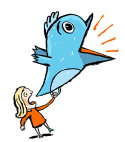
|
|||||||||||||||||||||||||||||||||||||||||||||||||||||
|
For what seems like many years I was a lonely voice in the wilderness, whispering at first "River of News" then speaking more loudly and finally shouting from the rooftops, but people wouldn't listen. Developers patterned their "news readers" after email programs. Each feed was a box, and like a mail program it would tell you how many unread messages there were. "This is wrong!" I would say -- RSS is not mail. Well in 2006 or so, things turned in the other direction and rivers showed up everwhere. They call them streams, lifestreams, etc, but they're all the same basic idea. Park yourself on the riverbank and watch the news flow by. If you miss something, not to worry, if it's important some new story will refer to it. Then an interesting experiment, the AnnArbor.com switched its home page to be a river. Wonderful, fantastic, futuristic. A long time ago I predicted the front page of every news site would be a river. But now Joshua Benton at Nieman Lab asks, basically, is a River enough? Do you need some other structure to hang the news on? Yes, imho, you do. The question comes up on Twitter, when you want to know the context of a tweet, because sometimes people string them together. 140 characters isn't enough to express a full idea, so you write three or four. By the time you're at number four, someone has usually tweeted you back asking what you mean. The answer is in #1 or #2 of the 4-tweet sequence. If you answer the question, you'll just beget more questions, so you hope the person is savvy enough to click on your name and read your full stream to get the context.
News will work the same way, except someone who is skilled at organizing stuff will figure out where each piece goes in the hierarchy. This will provide the context, and you will also be able to find out What's New. Anyone who used the LBBS in 1981, that's 28 years ago, will understand, but in this world it's still a new idea. I wrote a narrative of this development process in 1988 when I was starting up UserLand Software.
Hate? People throw that word around far too casually. The other day a rep of SXSW said that I had hated on them because I suggested they were taking money to keep me off the speakers list since 1998 or so. I had asked many times why I couldn't get in, and was met with a stone wall. So like all human beings, my mind filled in the blanks. I asked to be enlightened, if it wasn't a payoff, what was it? I offered to run a retraction if they would tell me the real reason. Stone wall again. Oh well. I don't hate them. The word I would use to describe my feeling about SXSW is frustrated. But Comcast? I think that's the real thing. I'll tell you why. Love and hate have a mathematical relationship: hate = love + betrayed I would love to have Comcast service, but I would never sign up for it again unless they apologized for the treating me so badly. And while most companies apologize when they screw up, I have a feeling that Comcast thinks I should apologize to them. And that ain't never going to happen. Why write about this today? Well they're getting a lot of kudos because they try to fix their fuckups with reps who use Twitter to find unhappy customers. When I got fired as a Comcast customer, I was in contact with their Twitter caretakers. Not only couldn't they stop the Comcast machine from chewing me up and spitting me out, they had the gall to say they liked me while they were doing it! Now that's really asking for the hate. Imagine a girlfriend dumping you, hard, and while she's doing it saying she likes you. Well fuck that shit bitch. <-- There's the hate. But their service is much faster than my AT&T DSL. I pay my bills, in full and on time (as I did with Comcast), and they don't have Twitter accounts. They never cut me off (knock wood), and I never have to talk to a Twitter rep who likes me. Maybe I'm weird but that's kind of how I like to do business. Learning from the fire of 1991 Fires are on the minds of Californians, esp ones who live in the hills, like the ones in Berkeley and Oakland. In 1991 these hills burned. I watched the fire, safely, from a friends' deck on Potrero Hill. It seemed far away, but now I live here. In the RTN podcast on Monday I asked Doc Searls if we could learn from the fires in Southern California. Today, on InBerkeley, I ask if there are any old-timers who were here during the fire of 1991 who would share what they learned. |
"The protoblogger." - NY Times.
"The father of modern-day content distribution." - PC World.
One of BusinessWeek's 25 Most Influential People on the Web. "Helped popularize blogging, podcasting and RSS." - Time.
"The father of blogging and RSS." - BBC.
"RSS was born in 1997 out of the confluence of Dave Winer's 'Really Simple Syndication' technology, used to push out blog updates, and Netscape's 'Rich Site Summary', which allowed users to create custom Netscape home pages with regularly updated data flows." - Tim O'Reilly.
My most recent trivia on Twitter. On This Day In: 2008 2007 2006 2005 2004 2003 2002 2001 2000 1999 1998 1997. |
||||||||||||||||||||||||||||||||||||||||||||||||||||
|
© Copyright 1997-2009 Dave Winer. Previous / Next |
|||||||||||||||||||||||||||||||||||||||||||||||||||||




